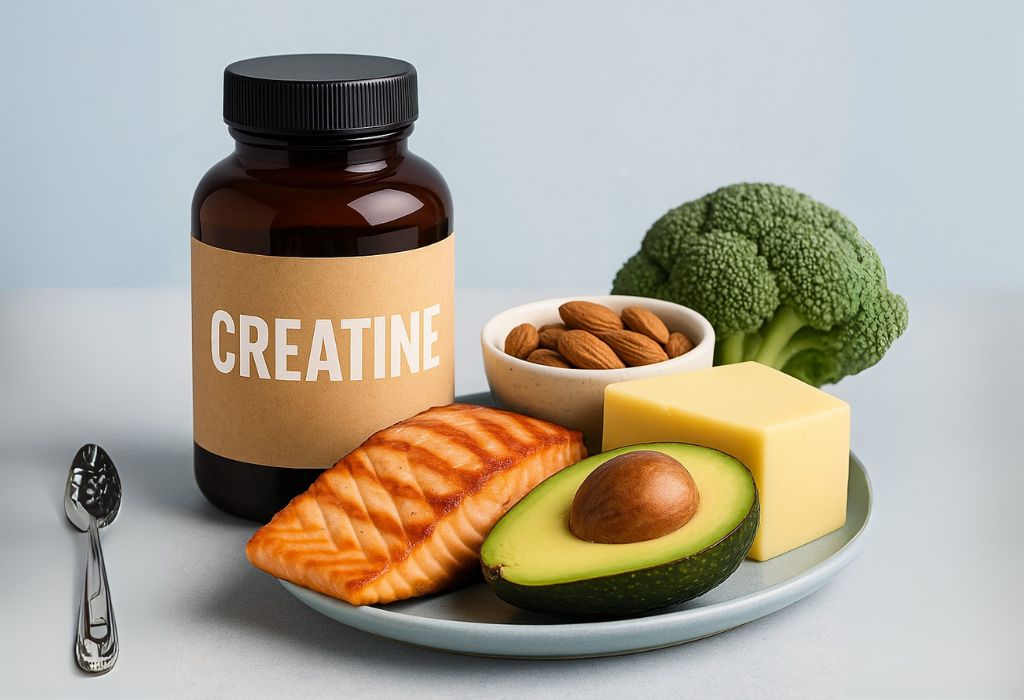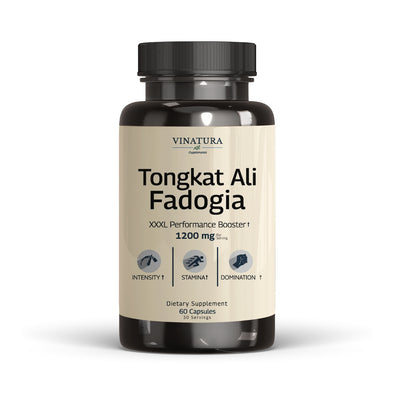
Creatine on Keto: Benefits, Dosage, and How to Use It
Creatine is fully compatible with the keto diet and can help support strength, energy, and muscle maintenance without affecting ketosis. Many keto users report improved performance and lean mass preservation when taking 3–5g daily.
While some may experience mild side effects like fatigue or constipation if hydration is low, creatine remains a popular and effective supplement for those following a low-carb lifestyle.
Before exploring further, please read the disclaimer located at the end of this webpage.
Key Takeaways
- People on keto store less creatine due to low glycogen levels.
- Creatine boosts workout performance and muscle recovery.
- Taking 3–5g of creatine daily can optimize results on keto.
- It doesn’t affect ketosis if taken correctly and at appropriate times.
- Creatine monohydrate is the safest, most effective, and cost-efficient option.
What Is the Keto Diet and How Does It Benefit Health?

The ketogenic diet, commonly known as keto, is a way of eating that focuses on cutting down carbohydrates while prioritizing healthy fats and moderate protein [10].
Instead of relying on glucose from carbs, the body is encouraged to use fat as its main energy source. This process, called ketosis, happens when the liver converts fat into ketones, providing an alternative energy source similar to fasting [10].
The keto diet offers many health benefits, making it a popular choice. One key advantage is its ability to support weight loss and manage obesity.
Studies show that very-low-calorie keto diets (VLCKD) are highly effective at reducing visceral fat while preserving lean muscle, leading to better weight loss results compared to low-fat diets [5]. Additionally, keto helps control appetite, which reduces hunger, making it easier to stick to the diet [5].
Read more: Should I Take Creatine On Rest Days?
Moreover, this diet improves blood lipid profiles by lowering bad cholesterol (LDL), increasing good cholesterol (HDL), and reducing triglycerides [5].
For those who love sports or focus on fitness, keto optimizes body composition by reducing fat mass without losing muscle and boosts resting metabolic rate [5]. These benefits enhance physical health, increase energy, and improve mental clarity [5].
The popularity of the keto diet stems from its ability to promote effective weight loss and better hunger control [10, 5]. From athletes to those aiming to improve their physique, many are drawn to its potential to enhance performance and body composition.
However, achieving and maintaining ketosis requires careful attention to nutrient ratios tailored to each person, along with awareness of potential risks from a low-carb, high-fat diet [12].
Is Creatine Compatible with the Keto Diet?

Creatine is fully compatible with the keto diet, supporting strength gains and muscle maintenance without disrupting ketosis.
Many keto dieters share online that adding creatine brings noticeable benefits. In a discussion with around 20 comments, over 70% of participants said they used creatine while on keto and saw positive results, such as improved strength and muscle retention during fat loss.*
For example, one user reported losing 11.3 kg in two months by combining keto with 3–5g of creatine daily, while still improving physical performance.* These experiences suggest creatine is a safe and effective supplement for a low-carb diet.
However, some users noted that creatine may cause constipation or fatigue if water or electrolyte intake is insufficient, as it increases the body’s hydration needs.*
Why Should People on a Keto Diet Consider Taking Creatine?
Creatine is a smart choice for keto dieters due to its ability to boost energy and support muscle health. It enhances workout performance and preserves lean muscle, aligning with keto’s goal of optimizing body composition.
By aiding ATP regeneration, creatine provides quick energy for muscles, helping keto dieters overcome the initial energy dip when starting the diet.
Thomas DeLauer, a well-known nutrition expert on YouTube, confirms that pure creatine monohydrate contains no carbs, ensuring it doesn’t disrupt ketosis while boosting strength for high-intensity workouts. His science-backed advice reassures users about creatine’s effectiveness.*
In practice, many keto followers report benefits from creatine. One user shared that taking 3–5g daily helped maintain strength and muscle while losing 11.3 kg in two months. Creatine also aids post-workout recovery, helping the body adapt to a low-carb diet.*
With clear benefits for performance and physique, creatine is an ideal supplement for keto dieters. The next section will detail the specific advantages creatine offers when paired with keto.

Benefits of Creatine for the Keto Diet
Supports Lean Body Mass
Creatine promotes muscle growth by increasing creatine and phosphocreatine storage, enabling tougher workouts and stimulating muscle growth through osmotic pressure [13]. It also activates growth factors like IGF-1, enhancing lean muscle development [15].
Research shows creatine users, especially vegetarians, gained 2.4 kg of lean muscle after eight weeks of resistance training, compared to 0.6 kg for the placebo group [3]. For keto dieters, creatine helps maintain muscle during fat loss, supporting physique goals.
Enhances High-Intensity Exercise Performance

By providing instant energy through ATP regeneration, creatine boosts performance in intense exercises, from leg strength to sprinting [4]. It increases muscle phosphocreatine by 20-40%, improving power and endurance by 10-20% [7].
A five-day creatine loading protocol showed physically active men achieving superior leg strength and anaerobic power compared to a placebo group [9]. Keto dieters benefit from this energy boost when carbs are scarce.
Aids Post-Workout Recovery
Creatine speeds muscle recovery after intense workouts by reducing damage and soreness [14]. Its antioxidant properties also limit inflammation, lowering creatine kinase levels—a marker of muscle damage [2].
Studies show creatine improves muscle strength after eccentric exercises, helping keto dieters maintain consistent training schedules and reduce fatigue, enhancing overall workout results.
Supports Lipid Profile
Pure creatine monohydrate helps regulate cholesterol and triglyceride levels, improving heart health [4]. Findings suggest creatine aids in managing blood lipids, which may contribute to better cardiovascular function [7]. For keto dieters, who already benefit from improved lipids through the diet, creatine adds extra long-term health value.
Offers Additional Therapeutic Benefits
Creatine supports overall health by maintaining cellular energy and protecting mitochondria [4].
Its antioxidant and neuroprotective properties may help support cellular resilience and energy balance during periods of physiological stress, such as reduced oxygen availability [11].
These benefits offer significant value for keto dieters, optimizing health beyond physique improvements.
How to Take Creatine on a Keto Diet
Getting Creatine from Keto-Friendly Foods
Creatine is naturally found in keto-friendly foods like meat and fish, providing protein-rich nutrition without disrupting ketosis. Meat contains about 3-4 g of creatine per kg, while fish, especially raw fish, offers 3-5 g per kg [13].
However, to reach a typical creatine loading dose of 20 g daily through food, you’d need to eat around 4 kg of meat, which is impractical for daily diets [1].
Thus, while foods like beef, pork, salmon, or tuna are great options for keto dieters, supplementing with creatine is often preferred to effectively increase muscle creatine levels, supporting strength and lean muscle maintenance while adhering to a low-carb diet.

Using Creatine Supplements
With many brands available, choosing the best creatine supplements can be tricky, especially for keto dieters aiming to stay in ketosis. Creatine monohydrate stands out as the best choice due to its high bioavailability, safety, and extensive research, making it the gold standard compared to other forms [8].
Alternatives like creatine ethyl ester, creatine HCl, or creatine nitrate have limited evidence of superior effectiveness, while creatine serum and creatyl-L-leucine show poor or no bioavailability [8].
Keto dieters should opt for products from reputable brands with cGMP or NSF certifications, ideally made in the USA, ensuring purity and no hidden carbs or sugars to maintain ketosis.
Mix 3-5 g of creatine monohydrate with water or a sugar-free drink to support workout performance and muscle health while staying keto-compliant.
How Much Creatine Should You Take on a Keto Diet?
To boost muscle creatine levels by about 20%, keto dieters can choose two approaches:
- A short-term high-dose method using 20 g daily, split into 4-6 doses of 5 g, for 5-6 days, increasing free creatine by 35% [8, 13].
- Alternatively, a long-term low-dose method uses 2-3 g daily for 4-12 weeks, achieving a 16.7% increase [8]. Older adults may use 0.3 g/kg body weight for 5 days, followed by 0.07 g/kg for 12 weeks, or 20 g/day for 7 days, then 10 g/day for 7 days [13].
A 5 g daily dose is optimal for blood plasma levels, but 2-3 g is also effective [8]. Keto dieters should start with a low dose to test body response, ensuring compatibility with a low-carb diet and avoiding unwanted side effects.
Things to Note When Taking Creatine on Keto
When combining creatine with a keto diet, certain precautions can help maximize benefits and avoid issues, building on the information about usage and dosage already covered. These factors are crucial since the body in ketosis has unique hydration and nutrition needs.
First, prioritize hydration and electrolyte balance. The keto diet often reduces water and minerals like sodium, potassium, and magnesium due to low carb intake, while creatine increases muscle water retention (Kreider et al., 2022).
To reduce the likelihood of cramps, fatigue, or brain fog, drink at least 2–3 liters of water daily and include electrolyte-rich foods like avocados, leafy greens, or lightly salted water—all of which are keto-friendly.
Next, monitor your body’s response when starting creatine. Some may experience bloating or slight weight gain from water retention, which is normal and doesn’t affect ketosis [8]. If discomfort like stomach upset or prolonged fatigue occurs, lower the dose and consult a nutrition expert to adjust usage.
Finally, ensure creatine supplement quality. Choose products free of additives or hidden carbs, as these could disrupt ketosis, especially for those new to keto (Kreider et al., 2022). Opt for brands with cGMP or NSF certifications for purity. These steps ensure safe, effective creatine use, supporting your health and physique goals on keto.
Testimonial Disclaimer
*The testimonials presented on this website are provided by individuals based on their personal experiences with our products. These testimonials represent individual opinions and experiences, which may not be typical or applicable to all users of our products. Results may vary depending on a variety of factors, including individual health, lifestyle, and adherence to product usage instructions.Conclusion
Creatine is not only safe for keto dieters but also a powerful tool to optimize performance and maintain muscle mass. With limited carbs, it’s even more important to maximize every factor to preserve strength and training results. Try adding creatine wisely and feel the difference—your body will thank you.
References
- [1] Clarke, H., Hickner, R. C., & Ormsbee, M. J. (2021). The Potential Role of Creatine in Vascular Health. Nutrients, 13(3), 857. https://doi.org/10.3390/nu13030857
- [2] Cooke, M. B., Rybalka, E., Williams, A. D., Cribb, P. J., & Hayes, A. (2009). Creatine supplementation enhances muscle force recovery after eccentrically-induced muscle damage in healthy individuals. Journal of the International Society of Sports Nutrition, 6(1), 13. https://doi.org/10.1186/1550-2783-6-13
- [3] Cooper, R., Naclerio, F., Allgrove, J., & Jimenez, A. (2012). Creatine supplementation with specific view to exercise/sports performance: an update. Journal of the International Society of Sports Nutrition, 9(1), 1–11. https://doi.org/10.1186/1550-2783-9-33
- [4] de Guingand, D. L., Palmer, K. R., Snow, R. J., Davies-Tuck, M. L., & Ellery, S. J. (2020). Risk of Adverse Outcomes in Females Taking Oral Creatine Monohydrate: A Systematic Review and Meta-Analysis. Nutrients, 12(6), 1780. https://doi.org/10.3390/nu12061780
- [5] Dowis, K., & Banga, S. (2021). The potential health benefits of the ketogenic diet: A narrative review. Nutrients, 13(5), 1654. https://doi.org/10.3390/nu13051654
- [6] Hall, M., Manetta, E., & Tupper, K. (2021). Creatine Supplementation: An Update. Current Sports Medicine Reports, 20(7), 338–344. https://doi.org/10.1249/jsr.0000000000000863
- [7] Kreider, R. B., Jäger, R., & Purpura, M. (2022). Bioavailability, Efficacy, Safety, and Regulatory Status of Creatine and Related Compounds: A Critical Review. Nutrients, 14(5), 1035. https://doi.org/10.3390/nu14051035
- [8] Kreider, R. B., & Stout, J. R. (2021). Creatine in Health and Disease. Nutrients, 13(2), 447. https://doi.org/10.3390/nu13020447
- [9] Law, Y. L. L., Ong, W. S., GillianYap, T. L., Lim, S. C. J., & Chia, E. V. (2009). Effects of Two and Five Days of Creatine Loading on Muscular Strength and Anaerobic Power in Trained Athletes. Journal of Strength and Conditioning Research, 23(3), 906–914. https://doi.org/10.1519/jsc.0b013e3181a06c59
- [10] Malhotra, V., & Sawal, A. (2023). Metabolic Effects of Ketogenic Diets and Their Utilization in Obesity Management: A Systematic Review. Cureus. https://doi.org/10.7759/cureus.36720
- [11] Marshall, R. P., Droste, J.-N., Giessing, J., & Kreider, R. B. (2022). Role of Creatine Supplementation in Conditions Involving Mitochondrial Dysfunction: A Narrative Review. Nutrients, 14(3), 529. https://doi.org/10.3390/nu14030529
- [12] Santangelo, A., Corsello, A., Immacolata, C., Chiara Maria Trovato, Agostoni, C., Orsini, A., Milani, G. P., & Peroni, D. (2023). The Influence of Ketogenic Diet on Gut Microbiota: Potential Benefits, Risks and Indications. Nutrients, 15(17), 3680–3680. https://doi.org/10.3390/nu15173680
- [13] Stec, M. J., & Rawson, E. S. (2025). BENEFITS OF CREATINE SUPPLEMENTATION FOR OLDER ADULTS. Brazilian Journal of Biomotricity, 4(4), 215–226. http://www.redalyc.org/articulo.oa?id=93021663002
- [14] Wax, B. (2021). Creatine for Exercise and Sports Performance, with Recovery Considerations for Healthy Populations. Nutrients, 13(6), 1915. https://doi.org/10.3390/nu13061915
- [15] Wu, S.-H. (2022). Creatine supplementation for muscle growth: A scoping review of randomized clinical trials from 2012 to 2021. Nutrients, 14(6), 1255. https://www.ncbi.nlm.nih.gov/pmc/articles/PMC8949037/
Author

Product Disclaimer
Including an ingredient or study does not evaluate, endorse, or recommend any Vinatura product or any third-party product. Some ingredients discussed may not be used in any Vinatura product.
The content of the articles has not been evaluated by the Food and Drug Administration (FDA) and is not intended to promote or endorse any specific product. Any products sold on this website are not intended to diagnose, treat, cure, or prevent any disease.
Opinions and Endorsements
Any claims, statements, or opinions expressed in the articles are those of the author(s) and do not necessarily reflect the views or opinions of the manufacturers of the dietary supplement products. The products sold on this website are separate from the content of the articles and are not directly endorsed or associated with the information presented here.
Liability Disclaimer
The author(s) of the articles, website, and manufacturers of the dietary supplement products do not assume any liability for any potential consequences arising from the use of the information provided in the articles. Ingredient effects, dosages, and safety vary by individual, formulation, and context; some ingredients interact with medications or may be unsuitable during pregnancy or lactation. It is recommended that individuals consult with a qualified healthcare professional before making any dietary or lifestyle changes, including the use of dietary supplements.
Product Usage
Please refer to the product labels and packaging for specific usage instructions and guidelines for the dietary supplement products sold on this website.
Customer Support
For any concerns or questions regarding the dietary supplement products, please contact our customer support team, who will be more than happy to assist you.





Leave a Comment
Be the first to comment.
What do you think?